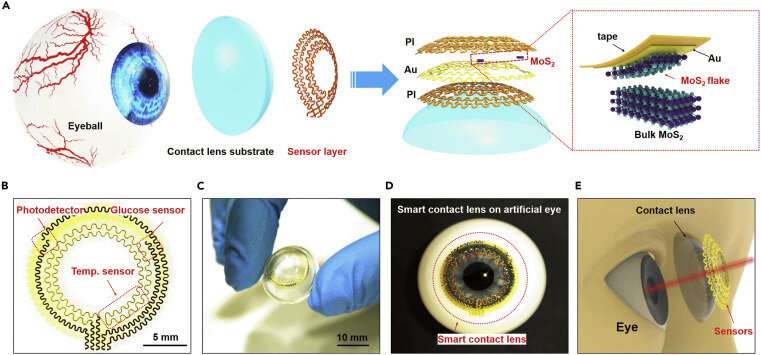Multifunctional lens sensor system could revolutionize smart contacts

The enormous impact of the recent COVID-19 pandemic, together with other diseases or chronic health risks, has significantly prompted the development and application of bioelectronics and medical devices for real-time monitoring and diagnosing health status. Among all these devices, smart contact lenses attract extensive interests due to their capability of directly monitoring physiological and ambient information. Smart contact lenses equipped with high sensitivity sensors would open the possibility of a non-invasive method to continuously detect biomarkers in tears. They could also be equipped with application-specific integrated circuit chips to further enrich their functionality to obtain, process and transmit physiological properties, manage illnesses and health risks, and finally promote health and wellbeing. Despite significant efforts, previous demonstrations still need multistep integration processes with limited detection sensitivity and mechanical biocompatibility.
Recently, researchers from the University of Surrey, National Physical Laboratory (NPL), Harvard University, University of Science and Technology of China, Zhejiang University Ningbo Research Institute, etc. have developed a multifunctional ultrathin contact lens sensor system. The sensor systems contain a photodetector for receiving optical information, imaging and vision assistance, a temperature sensor for diagnosing potential corneal disease, and a glucose sensor for monitoring glucose level directly from the tear fluid.
Dr. Yunlong Zhao, Lecturer in Energy Storage and Bioelectronics at the Advanced Technology Institute (ATI), University of Surrey and Senior Research Scientist at the UK National Physical Laboratory (NPL), who led this research stated, "These results provide not only a novel and easy-to-make method for manufacturing advanced smart contact lenses but also a novel insight of designing other multifunctional electronics for Internet of Things, human machine interface, etc." Dr. Zhao added, "our ultrathin transistors-based serpentine mesh sensor system and fabrication strategy allow for further incorporation of other functional components, such as electrode array for electrophysiology, antennas for wireless communication, and the power modules, e.g. thin-film batteries and enzymatic biofuel cell for future in vivo exploration and practical application. Our research team at ATI, University of Surrey and NPL are currently working on these fields."
"Different from the conventional smart contact lenses with rigid or bulk sensors and circuit chips that are sandwiched in between two contact lens layers and contacted with tear fluid via microfluidic sensing channels, our ultrathin sensor layer could be directly mounted onto a contact lens and maintain direct contact with tears, showing easy assembly, high detection sensitivity, good biocompatibility, good mechanical robustness and not interfering with either blinking or sight of vision." said by Dr. Shiqi Guo, the first author of this study and current postdoctoral research fellow at Harvard University.
"This multifunctional contact lens with field-effect transistors is able to provide diversified signals from eyes, which could be combined with advanced data analysis algorithms, providing personalized and accurate medical analysis for users. This kind of research will become one of the major research directions at the Ningbo Research Institute." added by the co-author Professor Sheng Zhang from Ningbo Research Institute, Zhejiang University.
Professor Ravi Silva, Director of the ATI at the University of Surrey, said: "Such innovative work fits in well with our institute's mission, which is aiming to address the 'grand challenges' in energy, healthcare, information technology, sustainable technology and more generally, technologies associated with "quality of life."
The research paper, "Integrated contact lens sensor system based on multifunctional ultrathin MoS2 transistors," has been published in Matter.
More information: Shiqi Guo et al. Integrated contact lens sensor system based on multifunctional ultrathin MoS2 transistors, Matter (2020). DOI: 10.1016/j.matt.2020.12.002




















